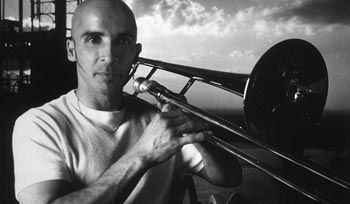![[Metroactive Music]](/music/gifs/music468.gif)
[ Music Index | San Jose | Metroactive Central | Archives ]
Trombone Triumphant
Salsa great Jimmy Bosch blows his 'life changes' into every note
By Robin Davies
JIMMY BOSCH'S gifted trombone playing has placed him in the royal court of the Latin-music industry, performing and recording with artists like Celia Cruz, Willie Colon, Ruben Blades, Marc Anthony and the Fania All Stars. He has now stepped into the solo-artist spotlight, recording two CDs: Soneando Trombon and Salsa Dura, both on RykoLatino records.
Bosch's CDs offer a collage of genres rooted in the Caribbean. Son, plena, yambu, guaguanco, guajira and Mozambique are some of the styles Bosch has recorded that are virtually unheard in the U.S. in their traditional form. However, Bosch does his music the old-fashioned way.
"It's about keeping the tradition," Bosch says. "I like to use a lot of the different rhythms I listened to growing up and do it the way it was done way back when in the '60s and '70s. This is when people listened to a whole record. My CDs are like that. You can listen and play them in their entirety."
The songs and arrangements on Bosch's latest CD, Salsa Dura, are searing with effusive rhythms that storm their tempestuous traditional beats into listeners' ears like a warm, intoxicating tropical rain. Bosch's lyrics represent some of the finest and most tender urban poetry written today.
Born in Jersey City, N.J., and raised in the flats of Hoboken, Bosch is the fourth of nine children. His family has always had deep musical roots. "My father was a notorious dancer--he loved dancing," Bosch says. "My mom, when she was a kid in Puerto Rico, would sing at parties with a trio. She sang the boleros. My uncle Israel was heavily into singing flamenco."
When he was 8, Bosch took a serious interest in music, joining his grade-school band. "I asked for the saxophone in school, but they said they only had the trombone. So I took it. At the time, the thing was bigger then me." Laughing, Bosch continues, "What I loved and still do today most about it is its closeness to the human voice [and] its sound."
In the neighborhood, he was deemed the "Trombone Sonero" because of the unique vocal-like playing he developed from daily practice sessions in his youth. "I never really had good trombone teachers growing up, so as a result I never really developed technique," Bosch comments. "So what I did was imitate the voice, the drums, the lead singers that I heard on records."
By age 13, Bosch was playing professionally with local groups. "I bounced around from any band and every band that called me for a gig and a rehearsal. The bandleaders would go to my house and beg my mom for permission to take me out [and] bring me back safely--I just wanted to play music."
BOSCH WAS ALREADY a seasoned musician in his late teens when he decided to study music formally. He enrolled at Rutgers University, but dropped out after two years. The top orquestas in the New York salsa scene were calling on him to play, which led to recording sessions with the greatest artists in Latin music. Bosch began touring with Manny Oquendo and Orquesta Libre, Ray Barreto and Israel "Cachao" Lopez. This is where he attended the "real music university" and learned "the real monas [musical riffs]" that he honed into his current intriguing improvisation skills.
After years of global touring and living the high life, Bosch, at age 31, found himself at a dark point in his life, caught up in the fast crowd, partying and drinking. "I realized that I was no longer growing as an artist," he says. "I was being irresponsible with my family, my work, missing rehearsals or showing up unprepared. I was losing my spirituality, and this scared me."
He then enrolled himself into a new school called "life change," and created a new pathway. "My philosophy in life is to allow yourself to experience and change. If the path you're on is negative, get off and create a new one." Bosch began reinventing himself by becoming a solo artist, a path that gave birth to new challenges and vistas: songwriting and composing.
"It was never my intent to become a songwriter--it just happened," Bosch recalls. "When I did my first CD, my brother Ruben died and I wrote a song. Then, on the second CD, my other brother died ... that's how I wrote 'La Noticia.' Both died of AIDS, and that's just two of the reasons I wrote 'Impacto Tendremos.' "
When asked about the future musically, Bosch says, "My vision is that people of all age groups and nationalities get in touch with the kind of songs and music that I play. I don't believe that this music belongs to any particular age group or nationality. My music is a passionate [and] spiritual music. It is a 'Wake up!' kind of music. What's different about my salsa band form ... is that other bands revolve around the singer. Mine is an open format--everyone is featured. It's not about Jimmy Bosch. It's about the 10 guys on stage playing and the audience grooving."
[ San Jose | Metroactive Central | Archives ]
![]()

Rhythm Rider: Trombonist Jimmy Bosch takes listeners on a ride through Caribbean styles on his newest album, 'Salsa Dura.'
Jimmy Bosch plays Sunday (April 23) at Fuel, 44 Almaden Ave., San Jose. Doors at 4pm. Tickets are $10-$12. (408.295.7374)
From the April 20-26, 2000 issue of Metro, Silicon Valley's Weekly Newspaper.